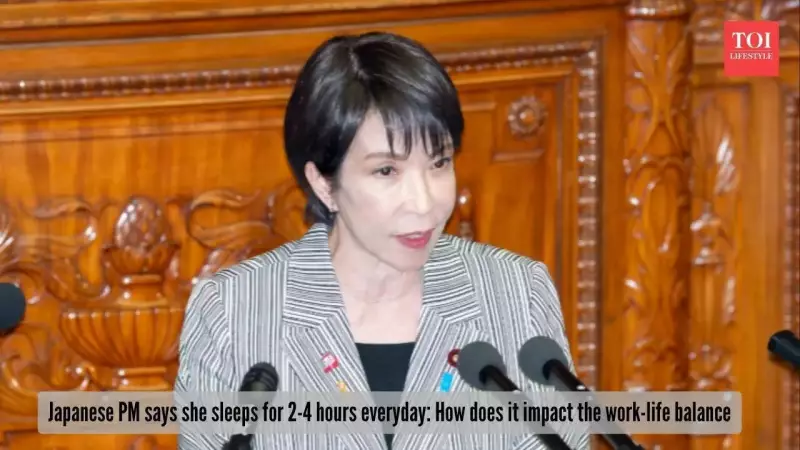
Japanese Prime Minister Sanae Takaichi has triggered widespread concern after publicly admitting she sleeps only two to four hours each night, drawing parallels to her political idol Margaret Thatcher's similar sleep habits.
The 3 AM Meeting That Raised Eyebrows
According to a Guardian report, Takaichi recently caused a stir by summoning her aides for a 3 a.m. meeting in her office to prepare for a budget committee hearing scheduled six hours later. This incident occurred just weeks after she made history as Japan's first female leader and pledged to "work, work, work, work and work" during her tenure.
The timing of her sleep confession couldn't be more significant, coming amid growing public unease about Japan's entrenched culture of overwork. This system has been blamed for everything from chronic employee exhaustion to the rise in "karoshi" - death from overwork.
More Than Personal Choice: National Implications
Takaichi's sleep schedule has transcended personal confession to become a national talking point, sparking debates about labor policies, leadership styles, and Japan's commitment to work-life balance, especially when demonstrated by someone at the highest level of government.
At a legislative committee, Takaichi revealed, "I sleep about two hours now, four hours at the longest. I feel it's bad for my skin," showing some self-awareness about the potential health consequences.
Contradictory Stance on Work-Life Balance
The Prime Minister's philosophy presents a complex picture. While she suggests that changes should prioritize worker health, stating "if we can create a situation where people can properly balance childcare and caregiving responsibilities and also be able to work, enjoy leisure time, and relax - that would be ideal," her personal approach tells a different story.
After becoming Liberal Democratic Party (LDP) president in October, she declared she would "discard the term 'work-life balance' for myself" and embrace her "work like a horse" mentality. This contradictory stance worries many who already struggle under Japan's grueling working norms.
The Serious Health Consequences of Sleep Deprivation
Research from the National Library of Medicine indicates that adults need about seven hours or more of sleep each night for optimal health. Consistently sleeping less than six hours can have serious effects on the body, extending far beyond mere tiredness.
When you regularly sleep less than six hours, your body's control over hunger and metabolism undergoes significant changes. A major review found that sleeping only five to six hours each night can double your risk of developing pre-diabetes or type 2 diabetes compared to getting seven to eight hours.
Studies also show that shorter sleep duration is linked to higher body weight. One long-term study discovered that people who slept less than six hours by age 27 were 7.5 times more likely to have a higher body mass index (BMI).
Finding the Right Balance
Establishing proper work-life balance involves setting clear work hours and adhering to them, enabling complete disconnection during personal time. Effective strategies include planning your day, prioritizing important tasks to avoid feeling overwhelmed, taking regular breaks, and making time for relaxation and hobbies.
This balanced approach helps reduce stress, increases happiness, and allows individuals to stay productive while enjoying life outside of work responsibilities.





